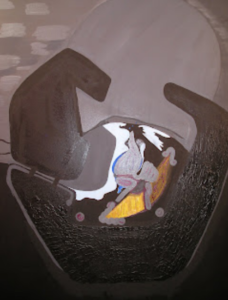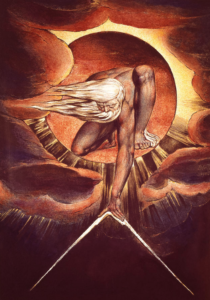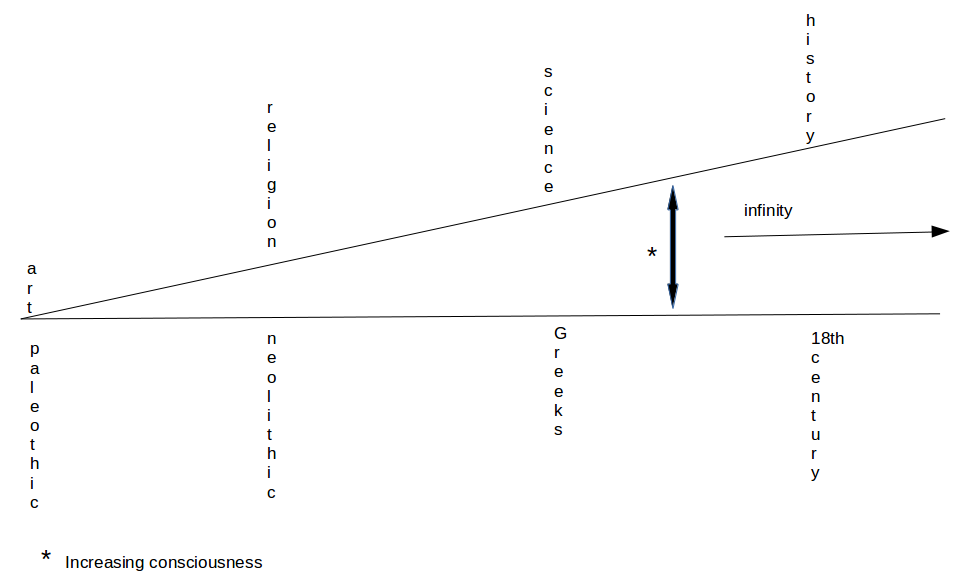Beauty is in the object, and it is in beauty that we see through the factual reflection of reality into Being itself. Plato
If the doors of perception were cleansed everything would appear as it is — infinite. We’re prisoners of our senses — imprisoned behind the five doors of perception. We can’t see through any others. William Blake
Those are old ideas, especially Plato (fifth century BC). William Blake lived in the 18th century.
Soren Kierkegaard, much more modern, lived in the 19th century. I keep going back to him, mainly, in order to gain some understanding as to the evolution of human culture. Christianity has played a major, world wide, role and Kierkegaard is known to have been a Christian though he certainly wasn't your garden variety "Bible thumper", though he was a minister, stood in th pulpit as such. I can imagine hearing one of his sermons. One wonders whether his philosophical ideas made it into same.
Existential mass, he thought, was the "medium" of architecture and as such was the farthest removed from language. He thought it was the most abstract medium. By this he meant language is the most concrete medium. By medium he meant these were modes of expression, of course. The most abstract "idea", he thought, was the "sensuous genius" saying it is solely expressible in music because it is music alone that can express an energy, a storm, impatience, passion. And, it exists not in a moment, but in a succession of moments, moving always in an immediacy.
Kierkegaard believed that man's evolution had somehow gone astray. That is the problem he wrestles with. The idea of concrete versus abstract modes of expression are intended to provide a basis for addressing this issue. He came to be convinced that Christianity through suppression of sensuousness has done the opposite. Now, sensuousness is excluded by Christianity because it is deemed contrary to spirit. This, then, becomes rather the affirmation of sensuousness as a principle power of Reality. This, of course, is not what was intended. But that is what happened. Now, we have a forbidden fruit.
So, to the extent we are bound by Christian ideals; to the extent Christianity has affected all subsequent modes of human behavior this corruption has persisted - in one form or another.
Now, this writer has a quite different view of the religion. While I hold to Kierkegaard's ideas here there are other ways of understanding the religion if one considers even older religious ideas and possible meaning. Christianity is not, was not, a monolith. Its precursors, its reason for being in the first place, for some, give a completely different outlook on what "else" is going on here. Question is, which meaning survives and has the biggest impact on culture.
The Christian view, and this is certainly not from an esoteric tradition, is that homo sapiens have "dominion over the Earth". The ideas of Kierkegaard were not those promoted by the church elders, of his or earlier times. Christianity was largely a political movement; its precepts were promoted in order to enhance the power of those who considered themselves as at the top layers of society. So, of course, they chose what to teach, what not to teach with that in mind. They thus corrupted the true meaning of the story of Jesus for their own corrupt purposes.
Dominion over the earth. Now, the Age of Reason, the Industrial Revolution wouldn't have had the same impact on culture were it not for this underlying notion of man owning the earth. This ego centered movement continues to this day and appears to increasingly influence man's life, the environment in which he operates. There's been no abatement of this power we have arrogated to ourselves. Even those who struggle against global capitalism with its sole focus of exploiting people, ever expanding markets, consumerism run rampant, share the same ego-centrism as those who laid down the original bounds of propriety, rules of society.
One ring to bind them all, indeed. The machine only gets stronger. Its hold on us deepens ever more. It scoffs at the pale efforts of the environmentalist missionaries sent out to stem the tide that threatens to engulf every iota of life here and beyond.
Man not only worships the machine but is subsumed by it, is an extension of it happily making true in an interesting way the ancient Hindu precept that one who seeks God finds him in the same form in when he is sought. Like the early Christians we create the God that serves our desires best. For us, now, it is the machine "Hive".
What is this mystery? Perhaps the alternate lesson tends along the lines of the only way to find the True God is to yield, not be a seeker at all. So mere meek reverence is the best way? One should simply wait (on the Lord). We'd do well to recall another Christian tenet, the forgotten one? "The meek shall inherit the earth."
For mechanistic man steeped in the auto-phagia of global capitalism, consumerism, this is almost impossible but for the primitive it is the most natural thing in the world because he is close to, one with, nature. The primitive doesn't own the world but belongs to it. So, the more "progress", always increasing technological advances, the farther man is from his true self. Our artificiality increases with our absorption into consumerism.
The primitive knowing his soul, knows the soul of the Universe while the mechanistic man often denies even having a soul. And why not? There is no need for a soul if you have the soul of the hive. To have one of your own is mere superstition in that case.
My old teacher, Irwin Lieb, thought, rightly, in my view, that there was only one individual and that was the entire Cosmos. The Hindu notion above dovetails nicely with this. Our individuality is on loan from the True One and thus, so is the individual spirit. Lieb said we are only nominally individuals.
S. C. Gwynne, in his book "Empire of the Summer Moon" writes about the Comanche Indians. Primitives. He has a lament about the forced "repatriation" of one Cynthia Ann Parker who was adopted by her captors and became as they were "literally immersed in this elemental world that never quite left the Stone Age - a world of ceaseless toil, hunger, constant war, and early death. But also of pure magic, of beaver ceremonies and eagle dances, of spirits that inhabited springs, trees, rocks, turtles, and crows; a place where people danced all night and sang bear medicine songs, where wolf medicine made a person invulnerable to bullets, dream visions dictated tribal policy, and ghosts were alive in the wind. On grassy plains and timbered river bottoms from Kansas to Texas, Cynthia Ann - Nautday - had drifted in the mystical cycles of the seasons, living in that random, terrifying, bloody, and intensely alive place where nature and divinity became one."
That contrast with the world of the "hive" is electrifying. Finally, I suppose, when our confusion, depravity, depradation, has reached infinity we will reach for a savior again, a messiah, but it will of necessity be a false one for we have long since passed the point from which redemption is even possible. Abandoned to our fate perhaps some might realize then just what the meaning of "My spirit shall not always abide with man."
[caption id="attachment_677" align="alignnone" width="228"] Creatrix Singularity - John Hinds[/caption]
Creatrix Singularity - John Hinds[/caption]In that eternal darkness the abyss folds in on itself, collapsing infinities of deathly despair, hopelessness, and evil, lifelessness, where we eternally abide alone with our self induced pain, agony. We will have to own that "singularity" which we squandered our lives to reach and it is not going to be pretty after all. If only we recall before its too late what might have been had we taken the opportunity to follow the one true path of humility and selflessness. You know, those primitive notions.
We might see this now if only we weren't so blinded by our moral relativism, our virtue signaling - a form of evangelism, from that missionary spirit, isn't it? It says "I am holier than thou" so take heed of my new improved puritanism. It is a crisis of conscience that there is now a universal repugnance in western culture - Christian culture - to condemn anyone's lifestyle no matter how outrageous. We wouldn't want to hurt anyone's feelings, right? We have given up ownership of any morality whatsoever when we are forced to celebrate deviant behavior, wantonness, because, you know, everything is allowed, therefore judgment, condemnation of anything at all is to be censured. I'd like to know when we decided that the "elevation of choice over all other human goods" was how we would proceed. This is the "absolutization of autonomy" that now dictates how we react to outrageous behavior. What, I ask, happened to moderation? It is a quantum leap from "tolerance of difference and diversity to the celebration of difference and diversity." (Quotes from here)
Hope in vain that the societal tendencies providing for this "woke" dystopia will eventually be depleted of their energy and subside. This is a natural extension of "spreading the gospel" as modified by worship of the machine we've created to replace God. Wokeness is, then, a kind of theology. It says, for its adherents, "I own the truth" and the truth is whatever I say it is. They are full of certitude, ego-centrism again. They own God, indeed, made him again with their own hands. They believe they have every right to make everyone see the truth as they see it, for their own good, you see. They would annihlate those who oppose them. There's no humility yet their frustration will eventually manifest as seeking for a leader, a savior; their actions speak to a nascent longing for such. They despair, have the sickness unto death, are filled with self-loathing - that's why they mutilate themselves. But surely, they'll never admit their hopelessness is of their own making. It's always the fault of those who haven't yet been converted. They seek eternally to transfer their despair to an agency outside their control. They are nihilists in the truest sense.
[caption id="attachment_676" align="alignnone" width="210"] William Blake - from "Europe, a Prophecy"[/caption]
William Blake - from "Europe, a Prophecy"[/caption]Its axiomatic that the fundamental premise underlying the Age of Reason, it's grossest manifestation, the Industrial Revolution, is that everything can be explained, measured, and ultimately known - eventually. However, this is the opposite of the truth.
That's why we've no sense of belonging as did ancient peoples. We've sacrificed our sense of belonging to time, to place, for being a mere extension of the machine God we've made. We belong to that ever disappearing over the horizon singularity when knowledge reaches infinitude. No wonder primitives were better adjusted, lived a more fulfilling life. We are totally bereft of Mystery; there simply is no mystery that can't be solved for those embedded in the Age of Reason and its outcroppings. For our forbears it was all mystery and you accepted this and that acceptance made you complete. Being complete made you happy.
Until the Greeks man was at the complete mercy of the unknown. It was then that Protagoras famously claimed that "man is the measure of all things." Thus began our estrangement; thus we took the first tentative steps toward being a "stranger in a strange land." I imagine about the same time we began looking for a savior. Protagoras was a 5th century BC man, So, the bronze age.
So, the way home? We missed it many centuries past and our evolution has surely confounded the absence. There are esoteric teachings. The quote from Blake and Plato above touch these. These are worthy of Jesus and Buddha but while Buddha did talk like this on occasion, Jesus didn't, at least not as reported in the Christian Bible; it takes a special gift to get to the deeper meanings of the biblical writings. Jesus' teaching, for the most part, seems tailored for the most common people notwithstanding the presence here and there of the profoundest thoughts on being and meaning and purpose. Jesus was everyman's Lord. The evolved missionary spirit is a corruption thereof; it's teaching leads to self loathing, guilt, despair. Fear and trembling are its hallmarks. There's no exit. Your condemnation owns you yet you would save the world. Better to merely save yourself by taking ownership of same. Instead we intend that global capitalism, progress, will save us as before we intended that reason would. The Spanish conquistadors intended saving the (Comanche) Indians. Now they are as good as gone except for a few dusty old books. I here repeat the notion that has been advanced for millennia that one will appear that will appeal anew to all but that one will not issue from the good. No. It knows that we've made a Faustian bargain. That will be taken advantage of in the extreme in what is to come. If we fall for what we have now we'll clearly fall for anything. In an infinite universe whatever at all is possible will eventuate. Want monsters? We'll get them without some basis for boundaries.
There is a primitive creature, a worm, whose genes we have mapped. (I can't find the reference to this but I got it from a talk by Sean Carroll, Astrophysicist.) One gene's function is to tell the creature "this is my tail - don't eat it." Mankind has somehow willfully, blindly, misplaced that gene. Is this out of malice, ignorance, an agency working through us to promote our self destruction, i.e., evil. I'd be the first to admit I truly do not know, indeed, can't know. Its as much a mystery to me as the spirit that lives in a spring is for a primitive. I just accept it and try to make do with what's at hand. That would be understanding, noesis. I've given up on knowing a long time past....and, oh yes, I leave it to the divine mystery that actually owns it.
This great mystery in which we find ourselves is not, after all, knowable for it is a mystery to be discovered in the sense that discovery is the action of the unknown. In relinquising ownership of that mystery we come, at last, into our true nature. We own nothing. Its all void, all the way down. We don't even own ourselves. We are mere motes in the eye of that which sends us. And yet. And yet! Somehow we give purpose and meaning to the world. Be humble!
Dream not of transcendence. Pure fantasy. Dream rather that "deeds cannot dream what dreams can do—time is a tree (this life one leaf)."
